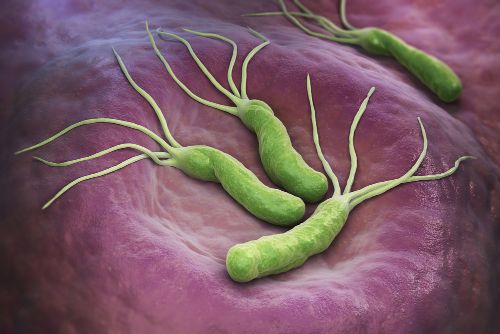A bacterium called Helicobacter pylori causes inflammation and ulcers in the stomach (gastritis) or the first part of the small intestine (duodenitis). It also increases your risk for stomach cancer. Symptoms include heartburn and pain in the upper abdomen.
Most people who are infected with H. pylori don’t have any problems or symptoms, but about 10% to 15% develop peptic ulcer disease (sores in the lining of the stomach or duodenum). Treatment is usually done to kill the bacteria, prevent a recurrence of ulcers, and keep them from coming back.
How do I know if I have an H. pylori infection?
There are several tests your doctor can do to find out if you have an infection. These tests can help your doctor make a diagnosis and treat the problem quickly. Some of the tests are blood and breath tests.
Breath test — your doctor will give you a drink that contains urea with carbon, and then take your breath. If you have an infection, the bacteria change the urea into carbon dioxide and your breath will contain more carbon than normal. The carbon dioxide is then measured by a lab and the results can tell your doctor whether you have H. pylori infection.
X-rays of the stomach and duodenum (first part of the small intestine) are another way to find out if you have an infection. Your doctor may use a special type of X-ray to look at the stomach and duodenum. If the doctor thinks you have an infection, they might order more testing.

Endoscopy and biopsy
An endoscopy is a procedure that uses a long, thin tube with a camera on the end to view your stomach and duodenum. The tube is inserted through your mouth and down into the stomach and duodenum. The doctor might remove a tissue sample for a lab to see if you have an infection and if it’s caused by H. pylori bacteria.
Your doctor will probably start your treatment with a short course of antibiotics to kill the infection and prevent it from coming back. They may also prescribe a drug to reduce acid in your stomach for 7 to 14 days. This combination of drugs is called proton pump inhibitors and antibiotics.
The length of time you need to take these medications is based on the severity and frequency of your symptoms. You may need to take them for a few weeks or more, but it’s important to stick with the treatment for the full amount of time prescribed.
These medicines will not cure your infection if you stop taking them early or if you miss any doses. They will still help control your symptoms and make you feel better.
A medication called proton pump inhibitors will help block the action of the bacteria in your stomach and reduce the production of gastric acid. This is the main cause of inflammation and ulcers in the stomach, so it’s important to take this medicine as directed by your health care provider.








